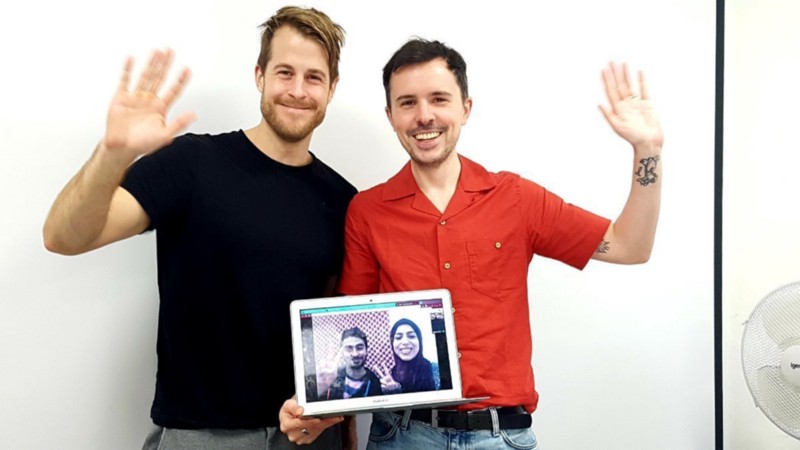by Rebecca Radding
“The most international micro-agency:” How two London bootcamp graduates built a remote collaboration with software engineers in Gaza
An interview with Joe Friel and Simon Dupree, the first pair of participants in the Founders Programme, the Founders and Coders social impact graduate fellowship
When I first sat down with Joe Friel and Simon Dupree to discuss their experience on the Founders Programme, it reminded me of Atul Gawande’s New Yorker piece “Cowboys and Pit Crews,” in which he examines the traditional cowboy role of the doctor and what he considers the more necessary formation of teams around medical issues.
In a way, Joe and Simon are two cowboys, successful professionals who through their experience working with developers in Gaza, have learned what it takes to join a “pit crew” — to effectively collaborate across geographic, linguistic, and political borders.
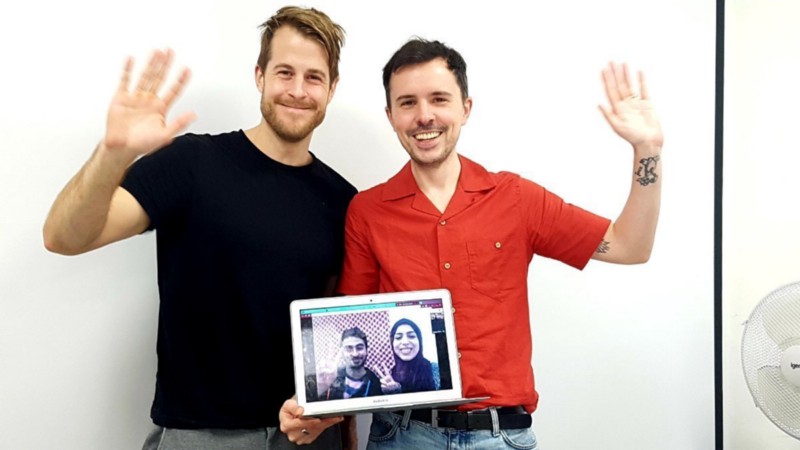
What is the Founders Programme?
“The Founders Programme provided a runway to create a freelance portfolio and the chance to work on socially and environmentally conscious projects with developers in Gaza. It was pretty much an opportunity I couldn’t walk away from!” — Simon Dupree
Rebecca: What were you doing before Founders and Coders, the London-based coding boot camp from which you graduated in October 2018?
Joe: Most recently, I ran a social media marketing business connecting influencers with brands; before that, I worked for a children’s media brand.
Simon: I was living in Berlin, where I was doing research at the University of Berlin in agronomy and environmental data science.
Rebecca: With such interesting careers, why make the switch to web development?
Joe: All my roles have had a strong digital focus and building things — most recently I oversaw the development of a platform that enables brands to identify, measure and manage influencers — which meant I was spending a lot of time managing digital projects and working with developers. I found this both rewarding and frustrating. Rewarding because it piqued my curiosity about web development, and I started teaching myself to code on the side. Frustrating, because I was relying on people who weren’t necessarily as invested in the ideas as I was, and I just really wanted to be able to build things myself!
At the same time, my work was focused on engaging young people, and I saw first hand how the growth of technology — which is, ultimately, morally neutral — was far outpacing regulation. I grew concerned that companies weren’t taking responsibility for their social impact and decided I wanted to work as a developer and focus on projects with a positive social impact. Founders and Coders is an amazing combination of those things, and I was thrilled to be accepted into the programme.
Simon: Like Joe, I first started coding on the side, in my case, a bit of Python while working with a team of developers on some data science work. I thought to myself, wow, it’s crazy how much freedom developers have in their way of thinking! You just bring them ideas and they can create something from scratch. I wanted to do more of that.
Rebecca: In your own words, what exactly is the “Founders Programme?”
Simon: The Founders Programme is an opportunity for a pair of graduates from Founders and Coders to collaborate with developers in Gaza (graduates of the Gaza Code Academy) on pro bono projects for nonprofit organisations and social entrepreneurs. The developers earn a small stipend while building a freelance portfolio that provides them with a runway into founding their own agency or social impact startup.
Rebecca: Why did each of you apply to the programme?
Joe: I knew I wanted to use my skills as a developer to make a social impact, but I figured I wouldn’t be able to afford this until I did my time in a commercial company. So when the Founders Programme came along, I seized the opportunity to fast-track my desire to get into impact-oriented work.
The Founders Programme is a continuation of client projects that we do on the bootcamp through Tech for Better. I’d been quite involved in getting the clients in, and I was fascinated by the kinds of problems these nonprofits and social entrepreneurs brought into the space.
Simon: I’ve long dreamed of having the freedom to work independently, so throughout the course, I’d been wrestling with the question of whether to take a full-time job or pursue a career as a freelancer. When I met some people from previous cohorts who shared their successful experiences with freelancing, I knew that was what I wanted to do.
Joe and Simon team up
“Someone asked me the other day if I would have done this with many other people, and I said probably not. With a learning curve this steep, you need a partner you can trust with your life!” — Simon Dupree
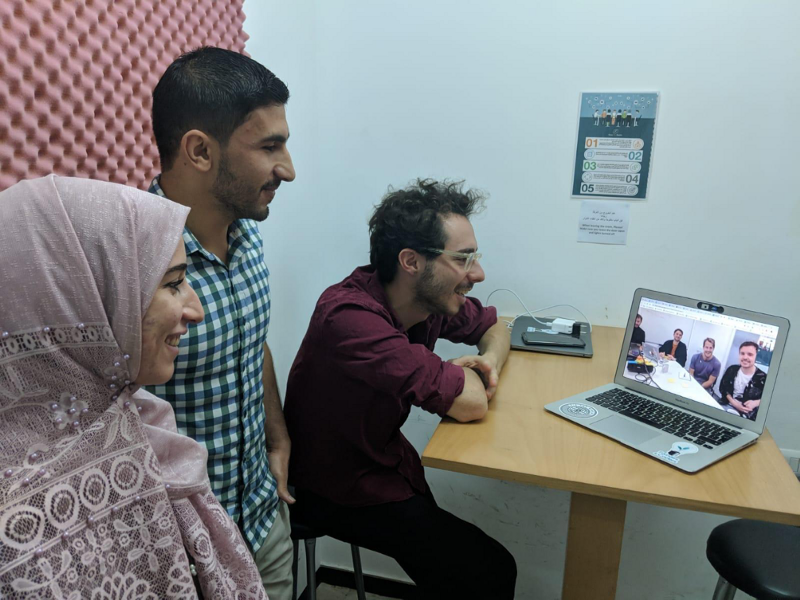
Rebecca: When did you realise you wanted to work together?
Joe: If you still get on pairing when someone using a German keyboard, it’s a good sign you’re pretty good at pairing together!
When we both got into the programme, though we applied individually, we made it pretty clear we wanted to work together. We even worked on our applications together. Because of our feedback, Founders and Coders has tweaked the programme and people now apply as pairs.
Simon: Someone asked me the other day if I would have done this with many other people, and I said probably not. With a learning curve this steep, you need a partner you can trust with your life!
Joe: Yeah. The Founders and Coders experience was already intense. There were 16 of us in a very hot room (the infamous summer of 2018!) constantly learning all these new things, building things together, nervous about getting a job, and uncertain what we were doing with our lives! Then with the Founders Programme, it was down to the two of us, working remotely with developers in Gaza. Safe to say, from the start it was important for me to know we’d get on with each other.
Rebecca: So how did you make it work?
Simon: For starters, we’ve become good friends and have interests in common apart from coding. It’s important to have something else to talk about: in our case, we both produce music on the side.
We’re also roughly on the same technical level. Though we have different strengths and weaknesses, we figure things out together. In my experience, if your coding partner is way more advanced, it doesn’t work as well.
Joe: To be honest, we’ve had our conflicts. But even the few times we got stressed, we were good at reading each other and giving each other space.
Simon: At the beginning, there was a bit of FOMO (fear of missing out), where we felt like we had to understand every part of everything. But at some point this became less important, which was helpful. Both of us got better at strategizing where to put our energy, so we could work a bit more independently while still being able to pair. So, gradually, things have gotten less intense.
The Pit Crew
“It quickly became clear that as a remote team we would live or die by our adherence to agile processes.” — Joe Friel
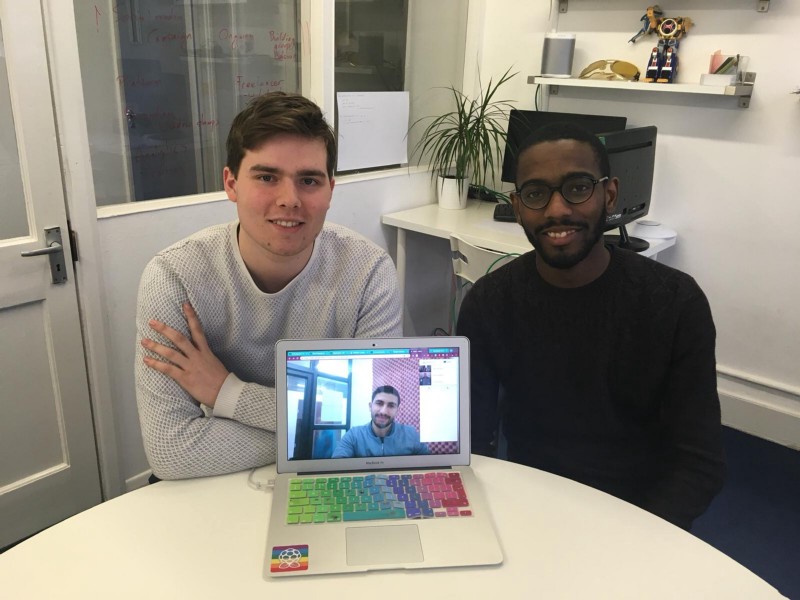
Rebecca: Tell me about what you’ve called the “dual mission of the Founders Programme.”
Joe: Well, the first part is about providing solutions for nonprofits that wouldn’t otherwise have the resources to access digital service development.
The second part is about providing employment opportunities for developers in Gaza. It’s hard enough finding good freelance work in London, but it’s unimaginably difficult when you’re working remotely from Gaza. It’s about getting London developers comfortable with working with Gazan developers not as an outsourcing pool but as collaborators.
Simon: I also hope that the Founders Programme strengthens the ties between Founders and Coders and Gaza Sky Geeks. Unless you’re one of the few mentors who’s been out there, the Gaza Code Academy is this cool thing on a slideshow. The amazing thing about the Founders Programme is that we’ve had the opportunity to make friends with people in Gaza, even though we haven’t physically travelled to Gaza.
Joe: Don’t get us wrong, we’d love to visit, and we’re hoping to do so soon. But these remote relationships are important in their own right.
Rebecca: Tell me more about working on remote teams with developers in Gaza. What was the setup during the Founders Programme?
Simon: We worked in teams of four, so on each project Joe and I worked with a different pair of developers in Gaza. Over the course of four client projects, we worked with Ramy, Asala, Haneen, Ismail and Marwa. It has been a real journey — exciting and fruitful, at times overwhelming and always intense. The process of establishing a well-rounded remote workflow wasn’t always easy, but we’ve learned a lot.
Rebecca: What are the most important lessons you’ve learned so far?
Joe: Number one, processes are SO important. We learned best practices during the bootcamp — agile, writing proper GitHub issues, scrum. But it’s easy to fall into paying lip service to best practices when the person you’re working with is right there across the laptop and you know them well, having already worked together for three months.
On our remote team, we not only work different hours (there’s a two-hour time difference between London and Gaza) but also on different days of the week (they work Sun-Thurs instead of our Mon-Fri). So there’s two days a week when we don’t overlap. And then we have a language barrier. Their English is amazing, but we still have misunderstandings.
It quickly became clear that, as a remote team, we would live or die by our adherence to agile processes.
Simon: We learned the hard way during our first project. We didn’t track our processes well enough, didn’t plan out the scope very well, didn’t use GitHub to plan the project properly, and so on. We also didn’t plan enough time to get to know the Gazan developers before meeting the client together. Making time to get to know each other is such an important part and beneficial for a harmonious workflow.
Joe: It’s interesting. I was just looking at our Tech for Better student projects, and noticed how sporadically we used labels and how infrequently we wrote out full issues. Under those circumstances, it was absolutely fine. But if we did the same thing with our partners in Gaza, I wouldn’t know what Ramy was doing on Sunday, so I could end up working on the same code; or I’d be stalled because Ramy wouldn’t be sure what was okay to work on and couldn’t get ahold of us.
Needless to say, freelancing with a remote team has turned us into massive advocates of agile process.
Simon: Sometimes agile is taken as a way to make things user-centered and product owner-centered, which is certainly important, but we learned that agile processes are just as important for the team as they are for the users. Agile involves everyone on the team and provides each of us with roles. It’s a ball that bounces back and forth.
Rebecca: Walk me through the most important parts of your current processes.
Simon: If we’re working with a new pair, we make time for all of the developers to get to know each other. Then we define the user stories into discrete problems that people can work on independently.
Joe: We have daily standups in person via Google Hangouts from Monday to Thursday, which goes a long way towards developing a personal relationship with the developers in Gaza. We realised quickly that even with great processes, things still go wrong, so you need to have a basis for trust, so people don’t take mistakes personally. The developers in Gaza feel like the “remote” ones for the client, and can fear they are missing out on some conversations and worry they aren’t aware of something.
On one of our projects, for example, the product owner kept changing the scope, and our partners in Gaza thought we might be more aware of what was going on, but actually we didn’t know either! It’s totally understandable they could think we’re having more conversations with the client that we’re actually having. The onus is very much on us to ensure that all those conversations are minuted in GitHub so they don’t worry they are missing out.
Simon: Big takeaway: a lack of communication just absolutely kills the project.
The most international micro-agency
“It’s so important that we can all speak frankly, so you know you’re coming to a final decision as a team, and everyone is bought in.” — Simon Dupree
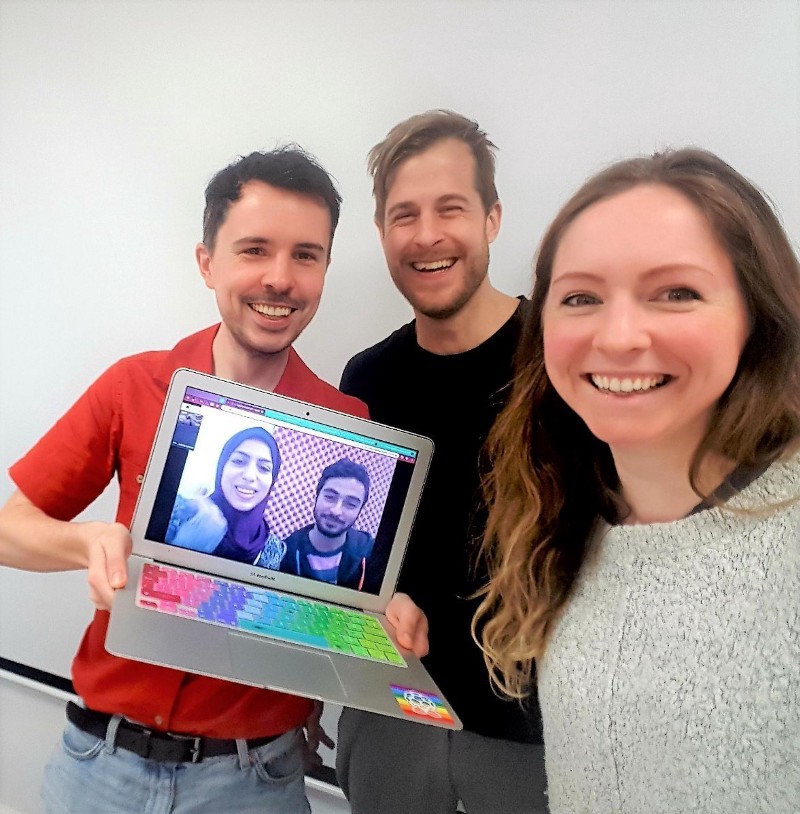
Rebecca: Tell me about the developers you’re working with in Gaza.
Joe: Ramy Shurafa is a graduate of the Gaza Code Academy who previously studied and worked in civil engineering and GIS.
Simon: Ramy is just a better developer than we are! He lives for the code and is super smart, so he’s really good at thinking through the backend and the database work. But even this doesn’t do him justice because he can really teach himself anything.
Joe: And, importantly, he teaches us too! Pretty much whenever Simon or I hit a problem, Ramy is there to help us out and find the solution.
Simon: Also, what’s great is that as we’ve all gotten to know each other — we’ve worked together for almost half a year now — we’ve become much better at true collaboration in the running of projects. It’s so important that we can all speak frankly, so you know you’re coming to a final decision as a team, and everyone is bought in.
Joe: Asala, who actually just recently got a full-time job, is only twenty and one of the youngest people to go through the bootcamp. She’s got a great eye for design and pairs well with Ramy. This is also important because, in a remote team, if people aren’t pairing together when they can, things can quickly become far too siloed, with only one person understanding a certain part of the codebase.
Rebecca: Switching gears, tell me a bit about the products you built on the Founders Programme.
Simon: We built three apps: Nightingale, an app that aims to help students reflect on their emotions and work out what’s affecting them at school; My Pickle, a connector for people offering support and individuals looking for support; and Connect 5, a mobile app that allows Connect 5 trainers easily to share survey forms with course participants and to collect results.
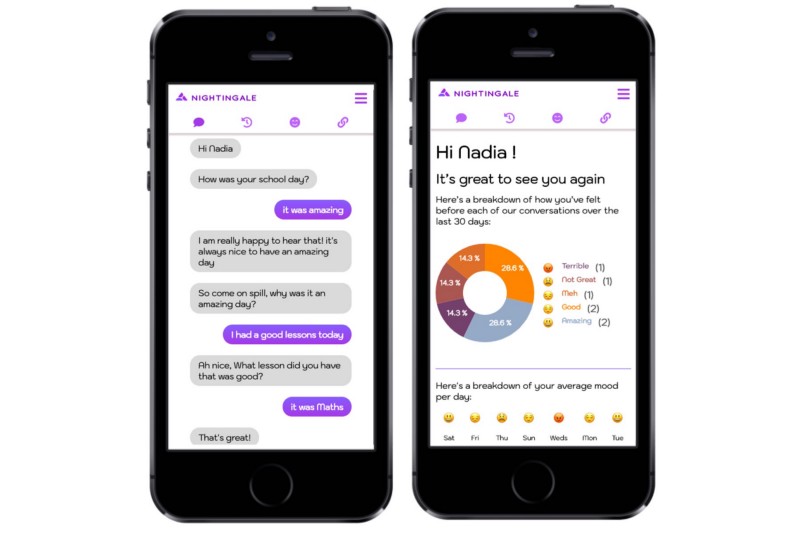
Rebecca: What would you say was the most important lesson to come out of this process?
Joe: One of the biggest lessons I’ve learned is that it’s so important to agree to a narrow scope and stick to it. With one of our projects, our product owner was so enthusiastic that we got really invested in the project, which led us to agree to too many features, and before we knew it, we had a bloated project.
We’ve also learned how important it is to make sure the client (or “product owner”) buys into the process of scoping and sticking to it! You have to sort of sell the process by telling the client, “We want to make sure we achieve for you what we agreed. If we add more things you may not get the functionality you want.”
The last project we scoped really well and we were positive and firm, so our client understood the reasoning. It really showed us just how important experience is. It’s hard to be firm when you don’t have firsthand experience.
Simon: It’s also been interesting to note how having to pay for something changes people’s behavior. On the Founders Programme, the product owners weren’t paying, so they might not have fully understood the consequences of changing the scope. On the other hand, it made it easy to be honest. On the final Founders Programme project, for example, we were building a chatbot, which we had never done before, and it was okay to admit that.
The project we’re currently on is a paid project, and you can clearly see how money changes behavior. Our client checks our daily standup logs, which affects the process and makes it even more important to have a consistent team process in place.
Rebecca: You guys were literally the “founders” of the Founders Programme. How did your experience inform the next iteration of the programme?
Simon: In addition to people applying in pairs, as mentioned earlier, for the next pair the Founders Programme will last a bit longer. We realised pretty quickly that two projects over two months does not provide much of a runway for building a freelance practice, so now it’s three projects in three months.
Joe: We’ve also documented the whole process to create an initial handbook. We realised how important the initial “set-up” before each project is. It’s so easy to just think about the app you’re looking to build. But to make the process go as smoothly as possible, there are so many things you need to do — setting up the channels of communication, building a team rapport, giving yourself time to build a pipeline. We made a lot of mistakes! But hopefully that means the next pair are now equipped to do better. And in turn they can iterate on the handbook, and on and on.
We’ll also be around, hopefully, to be of help in any way they like. Helping each other out is core to the ethos of Founders and Coders, so it’s important to keep that in the Founders programme too.
Rebecca: What’s next for the two of you?
Simon: As you know, we recently founded Yalla Cooperative. We’re a collective of freelance web developers across the UK, Gaza and Germany. Currently our team consists of Joe, Michael, Ramy, Asala and myself — we all went through either Founders and Coders or the Gaza Code Academy. We’re hoping to be able to take on more projects so we can establish our agency and bring more work to Gaza! I’m positive that we’ll be able to spin off further micro-agencies such as Yalla that work remotely, diversifying tech and facilitating personal empowerment.
Joe: Yeah, covering UK, Gaza and Germany we like to think of ourselves as the most international micro agency out there! Actually, we just delivered our first paid-for project for a leading UK charity called Tempo, and excitingly one of our Founders projects just secured funding off the back of the app we developed for them, so we will be working on that too. It’s kind of amazing — if you’d said that a few months after finishing the bootcamp we’d be doing paid work for our own digital agency, we probably would have laughed!
Funding for the Founders Programme is generously provided by Intersticia.
To learn more more about how your organisation can work with developers like Joe and Simon, visit www.foundersandcoders.com/techforbetter.
